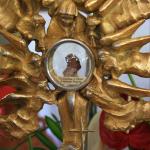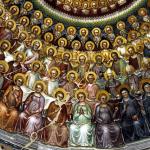Gavin Ortlund is an author, speaker, and apologist for the Christian faith, who serves as the senior pastor of First Baptist Church of Ojai in Ojai, California. Gavin has a Ph.D. from Fuller Theological Seminary in historical theology, and an M.Div from Covenant Theological Seminary. He is the author of seven books as well as numerous academic and popular articles. For a list of publications, see his CV. He runs the YouTube channel Truth Unites, which seeks to provide an “irenic” voice on theology, apologetics, and the Christian life.
I greatly admire and appreciate Gavin’s ecumenical methodology, and viewpoint. It’s extremely refreshing to hear in this hyper-polarized age. He is an exemplary Christian role model of this open-minded, charitable approach. We all learn and “win” when good, constructive dialogue takes place. It’s never a “loss” to arrive at more truth or to recognize one’s own error.
*****
I just completed an intensive 8800-page reply to a video of Gavin’s on this topic two days ago. But alas, he was curious about my reaction to his “Response to Trent Horn on Purgatory” (12-29-21). I like to fulfill folks’ request, as I am able, so here we go. I eagerly look forward to Gavin’s extensive replies to my critiques, too. At the moment he is too busy, which is fine. But some day he’ll have more available time on his hands . . . His words will be in blue.
I don’t like repeating myself (there are tons of topics to cover in apologetics, and we must make the best use of our time), so I will respond only to arguments in this video that I haven’t essentially already replied to last time.
Gavin mentions the “core essence” of purgatory. Yes, we Catholic apologists (including Trent Horn) often focus on that, especially regarding the earlier Church fathers because this is how it is with virtually all doctrines. They develop and become much more fully understood as time goes on. So there is nothing odd or unusual about boiling down the essence of the doctrine to a few ideas. It can be as simple as five words: “purging of sin after death.” Things, for example, like whether the purgatorial “fire” is literal or not, or whether purgatory is a place or condition, are not essential elements. And for that reason, Catholics are allowed to hold different views on those matters.
Gavin wants to make the essence of purgatory larger than what most Catholics would conceive it to be:
The suffering of purgatory is punitive and expiatory . . . and it affects the extinguishing of guilt. [10:55-11:06]
I’d say that this is part and parcel of “purging” or “cleansing” or “purifying.” It’s simply sanctification after death, and as such , is clearly part of the essence of purgatory. It’s “soteriological” insofar as it is sanctifying. But since it was Protestantism that basically removed sanctification from salvation (or from justification, as we would consider it), then a Protestant can hardly argue (from their own perspective) that purgatory has anything directly to do with salvation It neither causes nor prevents anyone’s salvation. As Gavin noted at the beginning of his previous video: all who are in purgatory are saved and will eventually be in heaven.
The activities of living Christians help those in purgatory. [11:16-22]
Prayer or penance for someone in purgatory is not (technically) of the essence of purgatory. It’s a function of charity (intercession and works on behalf of others). It is always associated with purgatory, but I don’t see how it is of the essence of it, anymore than, say, the prayers of Christians for the suffering people of Ukraine, or for those who are about to be martyred are the essence of suffering or martyrdom.
He mentions “fire” as a third element. Much of this is semantics. Typically of Protestants, Gavin wants to see a full-blown, nearly fully developed purgatory in the fathers before he is willing to call it purgatory. Short of that, he thinks we should say less developed expressions are “anticipatory” or suchlike. There is a sense in which that is true, too. But in the end, we’re talking about the same thing. Is “I and the father are one” a full-blown trinitarian expression? No. But I would call it an aspect of trinitarianism, or simply trinitarian (even though the Holy Spirit isn’t mentioned), and I suspect that Gavin would, too. But this is part of the reason that he doesn’t see purgatory as widely in the earlier fathers as we do, because of definitional controversies, and (I would also say) either a minimizing of development of doctrine or some sort of misunderstanding as to what it is.
Gavin expressed similarly in a comment to me underneath his last video: “A lot of the issues come down to how we define purgatory, and how much wiggle room is allowed in ‘development.’ ” Exactly right. I have tried to explain where I am coming from and where I think most Catholic theologians and apologists would also be coming from.
He again complains that Catholics are reducing purgatory to post-mortem cleansing. One reason we do it, I suppose, is because virtually no Protestants (save for an occasional anomalous Wesley C. S. Lewis) even go that far in agreement with us. This “bare minimum” is already anathema and heretical (therefore, a harmful idea) to virtually all Protestants, who think that all such sanctification occurs in this life and that God zaps the saved in a millisecond, making them fit for heaven.
In other words, if an early Church father refers to merely cleansing after death, without other details, he is already speaking in a very unProtestant way, and is already revealed to be far more Catholic in his worldview in this respect than some form of “proto-Protestant.”
I dealt with the issue of east-west division on purgatory at length last time. We think there are reasons for Eastern Christianity’s and later, Eastern Orthodoxy’s departure from our view, and that they are insufficient and unsatisfactory. But I do agree with Gavin that east-west differences concerning purgatory sometimes (if not most of the time) do involve essential matters. I stated that last time, too. I would probably disagree a bit with Trent Horn’s take on this particular issue.
Gavin cites the Greek Orthodox Archdiocese of America, claiming that both purgatory and indulgences are “unwitnessed in the Bible or in the Ancient Church.” This is untrue, I have shown last time (and more so in links provided) how purgatory is massively indicated in the Bible, and that even Protestant historians like Schaff (directly contradicting Gavon’s view of how widespread it was) confirm that it was the leading tendency in the Church fathers up to the 5th century, too. I make a straightforward biblical case for indulgences, as well: a doctrine that is misunderstood by virtually every non-Catholic, and have written about the “History and Myths” regarding it, and also about a favorite Protestant whipping-boy, Johann Tetzel, the notorious preacher of indulgences.
He brings up the development of trinitarianism. There certainly were “wildly alternative ideas[s]” [16:45-16:50]. As I showed last time, in the east there was massive, scandalous, tragic recurring belief in Arianism, Monophysitism, and Monothelitism: all very serious Christological heresies. That was not merely “a little variation or error in the details.” [16:42-16:45] And so if that could occur in relation to trinitarian doctrine, so, too, could it occur (and it did occur) with erroneous views of purgatory or outright rejection of it.
He brings up Hippolytus again. I conceded last time that he “seems unaware of purgatory.” Individual patristic exceptions are not a problem for the Catholic system and outlook. He didn’t recall whether Trent Horn dealt with Hippolytus. I did and do. I agreed and continue to agree with with Gavin’s opinion: at least based on what he presented, without doing an exhaustive survey.
He asks why there is so little attestation of purgatory early on. Good question! I think the reason would be something analogous to what Cardinal Newman stated about the seeming late arrival of the papacy in patristic understanding:
As to this doctrine the question is this, whether there was not from the first a certain element at work, or in existence, divinely sanctioned, which, for certain reasons, did not at once show itself upon the surface of ecclesiastical affairs, and of which events in the fourth century are the development; and whether the evidence of its existence and operation, which does occur in the earlier centuries, be it much or little, is not just such as ought to occur upon such an hypothesis.*For instance, it is true, St. Ignatius is silent in his Epistles on the subject of the Pope’s authority; but if in fact that authority could not be in active operation then, such silence is not so difficult to account for as the silence of Seneca or Plutarch about Christianity itself, or of Lucian about the Roman people. St. Ignatius directed his doctrine according to the need. While Apostles were on earth, there was the display neither of Bishop nor Pope; their power had no prominence, as being exercised by Apostles. In course of time, first the power of the Bishop displayed itself, and then the power of the Pope. . . .
St. Peter’s prerogative would remain a mere letter, till the complication of ecclesiastical matters became the cause of ascertaining it. While Christians were “of one heart and soul,” it would be suspended; love dispenses with laws . . .*When the Church, then, was thrown upon her own resources, first local disturbances gave exercise to Bishops, and next ecumenical disturbances gave exercise to Popes; and whether communion with the Pope was necessary for Catholicity would not and could not be debated till a suspension of that communion had actually occurred. It is not a greater difficulty that St. Ignatius does not write to the Asian Greeks about Popes, than that St. Paul does not write to the Corinthians about Bishops. And it is a less difficulty that the Papal supremacy was not formally acknowledged in the second century, than that there was no formal acknowledgment on the part of the Church of the doctrine of the Holy Trinity till the fourth. No doctrine is defined till it is violated . . .*Moreover, an international bond and a common authority could not be consolidated, were it ever so certainly provided, while persecutions lasted. If the Imperial Power checked the development of Councils, it availed also for keeping back the power of the Papacy. The Creed, the Canon, in like manner, both remained undefined. The Creed, the Canon, the Papacy, Ecumenical Councils, all began to form, as soon as the Empire relaxed its tyrannous oppression of the Church. And as it was natural that her monarchical power should display itself when the Empire became Christian, so was it natural also that further developments of that power should take place when that Empire fell. Moreover, when the power of the Holy See began to exert itself, disturbance and collision would be the necessary consequence . . . as St. Paul had to plead, nay, to strive for his apostolic authority, and enjoined St. Timothy, as Bishop of Ephesus, to let no man despise him: so Popes too have not therefore been ambitious because they did not establish their authority without a struggle. It was natural that Polycrates should oppose St. Victor; and natural too that St. Cyprian should both extol the See of St. Peter, yet resist it when he thought it went beyond its province . . . (Essay on the Development of Christian Doctrine, 1878 edition, Univ. of Notre Dame Press, 1989, pp. 148-155; Part 1, Chapter 4, Section 3)
I discussed Tertullian last time, and also Cyprian at some length. No doubt my answers were not identical to Trent Horn’s, so they require a response at some point. I’m defending my arguments, not Trent Horn’s, where they differ from mine. He brings up the Syriac father Aphrahat. Trent Horn noted that he believed in soul sleep, which is heretical. I did, too, last time. He was simply wrong, and even John Calvin rejected soul sleep (though Luther didn’t). If Ephraem also didn’t express belief in purgatory, then I’ll accept Gavin’s word for that, having little desire at this point to delve deeply into his works, too.
Patristic eulogies were brought up. Last time, I stated: “I agree that there is such a thing as praying for the dead without presupposing purgatory.”
He mentions a bunch of fathers praying for the dead in different ways. Granted. I’d say they are all closer to Catholicism because they’re praying for the dead: a thing that is anathema to most Protestants. The doctrine develops over time and more consensus is reached.
He cites Gregory Nazianzus (Orations 39:19). To me, this is referring to purging of Christians after death, because of the portion of the Bible that Gregory alludes to: 1 Corinthians 3:12-19. The whole passage is about Christians, some of whom “will be saved, but only as through fire” (1 Cor 3:15). So it seems to me that he is referring to purgative suffering of the saved, which is what purgatory is about. So maybe he believes in purgatory after all, huh?
But Gavin cites him seemingly saying that to die is to immediately have pleasure in God’s presence. I would say that St. Paul says the same. But he also has a passage like 1 Corinthians 3. Gavin argued before that this referred only to Christian workers. In my previous reply I showed at length why I don’t believe this is the case.
He brings up St. John Chrysostom. I dealt with him at some length last time, too.
He says that he can agree with various points Trent made without damaging his own thesis. That’s exactly how I feel about mine! I think it survives all of Gavin’s points. He denies a universality of the view in the fathers. So do I. I believe in a “near consensus”: as Cardinal Newman put it, or a consensus seemingly more towards the later Catholic view than not (as Schaff say). I sincerely don’t think anything Gavin has brought up has overthrown that.
***
Practical Matters: Perhaps some of my 4,000+ free online articles (the most comprehensive “one-stop” Catholic apologetics site) or fifty books have helped you (by God’s grace) to decide to become Catholic or to return to the Church, or better understand some doctrines and why we believe them.
Or you may believe my work is worthy to support for the purpose of apologetics and evangelism in general. If so, please seriously consider a much-needed financial contribution. I’m always in need of more funds: especially monthly support. “The laborer is worthy of his wages” (1 Tim 5:18, NKJV). 1 December 2021 was my 20th anniversary as a full-time Catholic apologist, and February 2022 marked the 25th anniversary of my blog.
PayPal donations are the easiest: just send to my email address: [email protected]. You’ll see the term “Catholic Used Book Service”, which is my old side-business. To learn about the different methods of contributing, including 100% tax deduction, etc., see my page: About Catholic Apologist Dave Armstrong / Donation Information. Thanks a million from the bottom of my heart!
***
Photo credit: kai Stachowiak, “Purgatory” [PublicDomainPictures.Net]
***
Summary: 2nd reply to Baptist pastor Gavin Ortlund on purgatory. There wasn’t much new here, compared to my previous reply, but perhaps some things were clarified.














